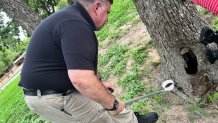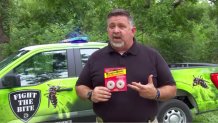This story has the community buzzing – literally.
The summer drought kept the mosquitoes at bay, but last week's historic rains have created the perfect conditions to unleash an army of biting insects.
All over North Texas, people are sharing reports of being swarmed at parks, gardens, and even a simple trip to the backyard. The comments on the NBC 5 social media pages are telling.
"Mowing this week they are swarming," said Vicki Davis. "Even Off with DEET didn't stop them. They're not just hungry they are hangry!"
Get DFW local news, weather forecasts and entertainment stories to your inbox. Sign up for NBC DFW newsletters.
"I live in the east Arlington area. They have been just awful," said Betsy Jarvis. "I enjoy sitting outside in the morning, but they eat me alive."
"Mosquitoes right now are the Texas state bird!" said Stephanie Andrews.
"North Collin County. They are going crazy in my backyard," said Justin Taylor. "Normally, they are all over the backyard. However, with the lack of rain this summer they have not been an issue at all until last week! Now they are everywhere! Can’t even open the back door without a few getting inside."
Local
The latest news from around North Texas.
"We went months without mosquitoes and I even slept outside a few times enjoying the meteor showers," said Emily Cunningham. "Now the mosquitoes are the size of small sparrows and really aggressive."
Turns out, there really is something different about the mosquitoes right now – it is another species than what most people are used to, known as a “flood water mosquito.”
The insects are bigger and more aggressive than your average mosquito.
“It lays its eggs in the dirt. And those eggs can stay there for up to three years before they hatch,” explained Michael Sanders, an environmental specialist for the City of Dallas consumer health division. “It takes a torrential rain, not just a regular rain, but it has to get over a quarter of an inch of rain and sit there for a minute. Then ... above 90 degrees, the ambient temperature of the water gets up to about 80 degrees. They hatch within three to five days and emerge as adults.”

Parts of North Texas experienced the perfect conditions for these types of mosquitoes to emerge.
"The rains came last Monday into Tuesday. And we saw them by Saturday. We started getting calls on Saturday,” said Sanders.
The critters sound like something out of a nightmare.
"They can fly up to two miles for a blood meal. So it doesn't even matter really where that floodwater was, they're going to go looking for the blood meal. We've gotten a lot of calls from various parks down in the southern area of Dallas,” said Sanders. “I can remember twice ever in my 15 years of seeing floodwater mosquitoes like this."
It’s not just floodwater mosquitoes but also the smaller ones that many are familiar with that typically carry West Nile virus.
Both the city of Dallas and Fort Worth regularly test mosquitoes inside various traps. So far, there are no reports of a mosquito carrying the virus.
“We have 90 traps throughout the city we're trapping every week, sending them to the lab testing them,” said Sanders.
Both cities have protocols that only allow spraying if WNV is detected in one of the traps or if a traps contains a high concentration of female mosquitoes of the certain species that carries the virus.
Still, Sanders is urging everyone to dump any standing water they find. During our interview, we found one pool of water at the base of a tree near White Rock Creek. He predicted it was filled with upwards of 1,000 larvae getting ready to fly.

"I have counted over almost 40 service requests just relating to floodwater mosquitoes. People want [us] to come spray their neighborhood. And unfortunately, that's not what the city policy allows for,” he said. “The only recommendation I can give folks is to wear repellent whenever they're outside."
The city is also offering free dunks that residents can throw in standing water to kill off larvae of any mosquito. It contains a biological chemical that comes from the dirt.
“One dunk will treat 100 square feet of water surface. They're mixed with some light corks so they float. The mosquitoes come up and feed on them and then do not emerge as adults. These packets are available almost anywhere but they are available in our offices,” said Sanders. “If you have a smaller area, break it up into smaller pieces. If you have a birdbath, you don't need four. So it's important to read the instructions.”

The dunks can be picked up at city offices located at 7901 Goforth Road or 3112 Canton in Dallas.
Fort Worth mosquito control officials are also reminding residents of the 5 Ds:
- Dusk: Avoid outdoor activity when mosquitoes are most actively feeding and flying.
- Dawn: Avoid the outdoors when “the light is changing in the sky.”
- DEET: Use personal repellents containing this effectively proven ingredient.
- Dress pants and long sleeves when in high-risk environments and hours
- Drain pooling water
Fort Worth officials also want people to report standing water to the city by calling 817-392-1234 so that crews can come out and treat it. Dallas residents can also call 3-1-1.
Luckily, the specific floodwater mosquito species should only be with us for a short time.
"The floodwater mosquitoes only stay around for about two weeks, maybe three at the most. And then they just kind of get away because there's nowhere else for them to lay their eggs,” said Sanders.



